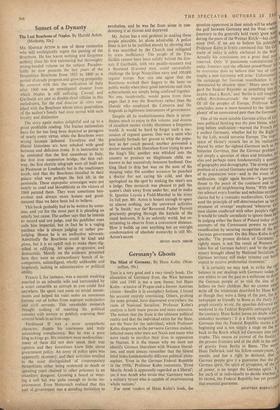Sunset of a Dynasty
The Last Bourbons of Naples. By Harold Acton. (Methuen, 50s.)
MR. HAROLD Ac-roN is one of those romantics who still nostalgically regret the passing of the Bourbons. He has learnt nothing and forgotten nothin3 since his first entrancing but thoroughly wrong-headed volume on the subject. Paradox- ically he now presents the last years of the Neapolitan Bourbons from 1825 to 1860 as a period of steady progress and growing prosperity. By contrast with this. the unification of Italy after 1860 was an unmitigated disaster from which Naples is still suffering. Cavour and Garibaldi are cast as double-dyed villains in this melodrama, for the real douccur de vivre van- ished with the Bourbons whom many generations of the author's family had once served with such loyalty and distinction
The story again makes delightful and up to a point profitable reading. The Italian nationalists have for far too long been depicted as paragons of nearly every virtue, while the Bourbons were wrong because defeated. Trevelyan and the liberal historians are here rebuked with good humour and delicious irony. It is instructive to be reminded that the first steamboat in Italy, the first iron suspension bridge, the first rail- way, the first electric telegraph were all built not in Piedmont or Lombardy but in the reactionary south, and that the Bourbons installed in their palace what was perhaps the first lift in the peninsula. These unpopular sovereigns were not nearly so cruel and bloodthirsty as the victors of 1860 painted them. They were sometimes ben- evolent and always more honest and good- natured than we have been led to believe.
This book probably had to be written by some- one, and yet for the most part it is pleading an utterly lost cause. The author says that he intends -to record and not judge, and his publisher even calls him impartial, but in fact he is a raging partisan who is always judging or rather pre- judging. Hence he is an ineffective advocate. Admittedly the Bourbons could be kind and pious, but it is an uphill task to make them dig- , nified or edifying, let alone progressive and democratic Merely on the evidence presented here they were an extraordinary bunch of in- competents, unintelligent, wholly unlikeable and hopelessly lacking in administrative or political ability.
Francis I, for instance, was a mental weakling married to an infantile wife and surrounded by a court camarilla as corrupt as you could find anywhere. He spent vast sums on trivial amuse- ments and helped his valet make an enormous fortune out of bribes from aspirant ecclesiastics • and civil servants. This unamiable monarch thought nothing of maiming his political enemies with torture or publicly exposing their severed heads in an iron cage.
Ferdinand II was a more sympathetic character, despite his coarseness and truly astonishing complacency. But he was a poor king as kings go. His ministers were mediocrities : many of them did not dare speak their true opinion and they sometimes knew little about government policy. An army of police spies was apparently necessary, and their activities resulted in the most distinguished of contemporary Neapolitans either being sentenced to•death or spending years chained to other prisoners in an insanitary dungeon. Growing a beard or wear- ing a soft hat was quite enough to invite im- prisonment. Even Metternich realised that this sort of ,government was a standing invitation to revolution, and he was far from alone in con- demning it as vicious and depraved.
Mr. Acton has a real problem in making these, people plausible, let alone admirable. A police State is not to be justified merely by showing that it was sanctified by the Church and mitigated by crass inefficiency The people of the Two Sicilies cannot have been solidly behind the dyn- asty if Garibaldi, with two paddle-steamers and a thousand ill-armed men, could successfully challenge the large Neapolitan navy and 100,000 regular troops. Nor can one agree that the Bourbons worked their fingers to the bone on public works when their good intentions and their achievements are simply being confused together. No one, incidentally, would guess from these pages that it was the Bourbons rather than the liberals who employed the Camorra and the brigands as legitimate instruments of government.
Despite all its tendentiousness there is never- theless much to enjoy in this volume, and dozens of excellent stories vividly illuMinate a forgotten world. It would be hard to forget such a suc- cession of regnant queens. One was a saint who graciously forbade her groom to whip the popu- lace as her coach passed; another prevented a doctor tainted with liberalism from trying to save the king's life; another was whisked into the country to produce an illegitimate child, un- known to her excessively innocent husband. One king liked to drip hot wax on the nose of his sleeping valet. On another occasion he punched a doctor for not curing his cold, and then apologised on the spot by making the man's son a judge. One monarch was pleased to pull the queen's chair away from under her, and to make St. Ignatius Loyola a Field-Marshal in his army an full pay. Mr. Acton is honest enough to spare us almost nothing, not the untoward activities of 'la Smith,' nor the Reverend Father Ferretti pruriently peeping through the keyhole of the royal bedroom. It is an unlovely world, but en- tertaining to observe from a convenient distance. How it builds up into anything but an outright, condemnation of absolute monarchy is still Mr. Acton's secret.
DENIS MACK SMITH






































 Previous page
Previous page